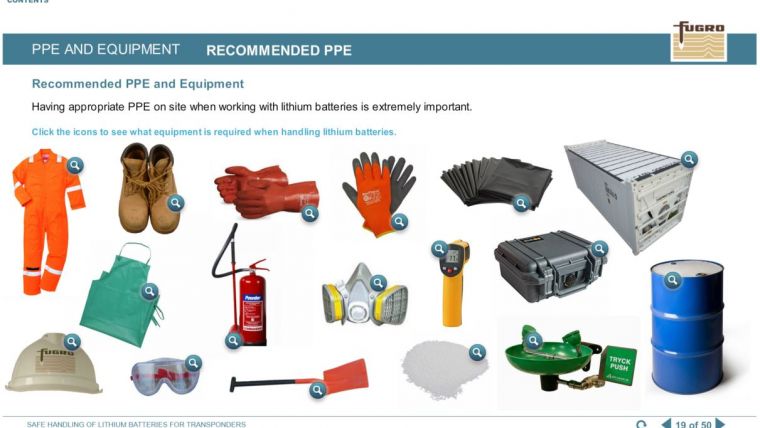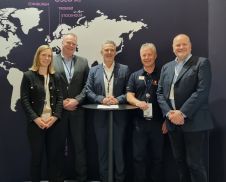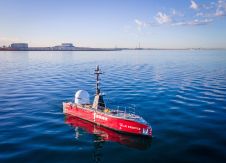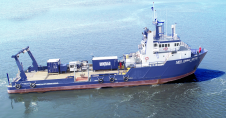The Importance of Continuous Education
How Fugro Academy Advances the Company’s Business
It is now well over ten years since Fugro Academy opened its doors within Fugro as a focal point for learning and development for the company’s 10,000-plus employees, who specialise in providing geoinformation and asset integrity services to a global client base. So, what is Fugro Academy and how does it contribute to the ongoing education and professional development of the largely technical workforce? Andrew McNeill, global talent development manager at Fugro, explains more.
Fugro Academy was established in late 2006. Around that time, Fugro was working in a very buoyant market, particularly for services related to oil and gas, and faced significant competition in recruitment of staff. However, even with a successful recruitment campaign in place for geomatics professionals, it can take some time for newly hired staff – usually graduates – to go through the training and development programmes needed for them to become efficient members of the teams deployed on projects.
The organisation at that time was also highly decentralised with many local offices, and so achieving certain efficiencies and economies of scale was not always possible. At Fugro, we also needed to increase standardisation in processes and systems so that staff could be deployed more flexibly across projects and meet the expectations of international clients. Against this backdrop and series of objectives, we set about putting the resources and infrastructure in place that provided the basis for Fugro Academy, upon which we have continued to build in the 11 years since initial launch across the organisation.
Bricks and Mortar or Clicks and Mortar?
One of our first considerations was in what form Fugro Academy should exist. Traditionally many corporate training departments or academies have a physical presence, and staff from across the organisation travel to a central location for training events. This comes at a cost, however, and a previous attempt to gain support for a training school in this format at Fugro had floundered. We therefore decided to establish Fugro Academy as a virtual training school. We would have no permanent physical presence, but instead use existing facilities in our various offices. This had two immediate cost benefits. Firstly, there was no need to invest in further offices, classrooms and physical buildings to create the school. Secondly, it allowed us to reduce the travel time and costs for many delegates as the courses would be run locally at their offices, with the trainer travelling and delivering the course instead.
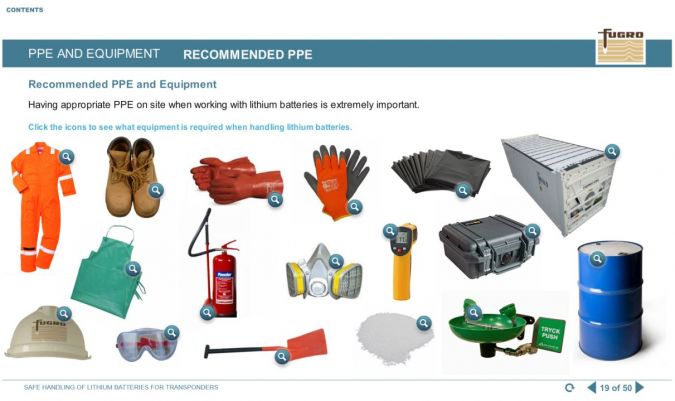
We recruited trainers from within our existing workforce, seeing this as an opportunity in itself for employees to further their careers within Fugro. All of our trainers are experienced technical professionals with years of operational and business experience. This knowledge and experience is invaluable, and so it was important to retain and share this within the organisation. Our trainers were also already used to business travel as part of their original roles, so were comfortable with the idea of travelling to deliver a training course.
Online Academy
Fugro Academy is not just a virtual school by the nature of our classroom-based course delivery. We also saw the potential and opportunity for online learning (‘e-learning’) for a global organisation like Fugro. Part of our initial development was the selection and implementation of a learning management system (LMS) to provide a virtual centre for Fugro Academy activities. The LMS would allow all training, whether classroom, e-learning or other, to be recorded and tracked for all employees. The use of e-learning allowed busy professionals to fit training and development around their own work schedules rather than having to fit their work around training class schedules.
But an LMS in a new training school is like a library with no books: just empty shelves. We needed to find courses that were relevant to our audience. Since many of our technical services are based upon Fugro’s proprietary software and systems, these courses had to be created. Therefore, we also invested in e-learning course-authoring software and trained our trainers and other subject matter experts (SMEs) to create e-learning courses. This enabled us to not only capture knowledge from our professional experts, but also to share it across the organisation – regardless of time and distance – to others within Fugro whose skills and knowledge could be developed via these courses. It also made certain training more cost-effective, as we no longer needed a minimum course length or classroom size for a course to run efficiently.
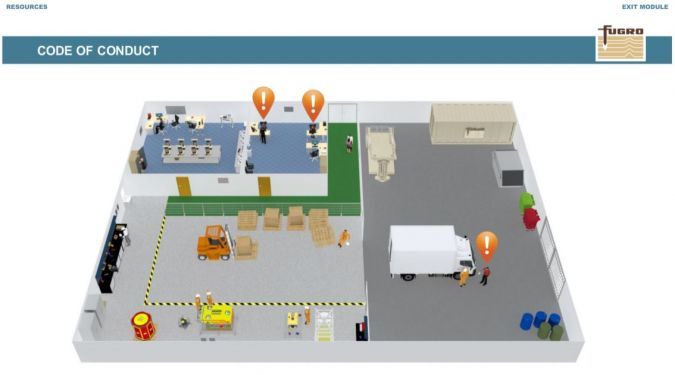
As time went on, we saw the need to develop more advanced and higher-quality e-learning courses, so we created an e-learning authoring team to work alongside the trainers and SMEs to help design and author courses. We also made use of advanced 2D and 3D multimedia and animation techniques to better illustrate the courses and make them more engaging for learners. Course development initially focused on technical topics but, as with other aspects of Fugro Academy’s capability, this has since expanded to cover other topics like health and safety, project management, compliance, finance and human resources, to name but a few.
Broader Range of Training
From day one of Fugro Academy opening its virtual doors, we planned to offer a broad range of courses, not just technical ones. Staff joining as graduates inevitably need further training to supplement and extend what they have learned at college or university, to put it into the context of the company and the industry they are employed in. Whilst much focus is initially placed on technical training to help technical professionals develop the knowledge and skills they need in their day-to-day work with software, equipment and processes, a much broader skill base is required over time. From the ranks of these technical professionals come the future leaders and managers who take responsibility for the business and moving it forward. Hence, as their career develops, their development needs change. Finance, project management, leadership, management, sales, marketing as well as soft skills all become areas where specific development is required so that these experienced professionals can take on higher and broader levels of responsibility, including the management of people. Fugro Academy provides courses and development programmes across this broader range of competencies to ensure we support the entire business as it requires. However, unlike for many of our technical courses which are internally produced, we work with external partners on the design and delivery of these business skills programmes. In truth, many of these skills are generic across a wide range of businesses. But value can be added to the individual and the organisation when the content is tailored to include Fugro-related examples and context, so we always adopt this approach rather than taking a pure ‘off-the-shelf’ option.

Boats and Mortar
Although our initial plan did not include the dedicated training centres we had seen in other organisations, after operating our virtual delivery model for a number of years we started to see that having our own facilities would be an advantage to the business. Therefore, in Plymouth, UK, we opened the first of two dedicated Fugro Academy Training Centres in 2015. The second followed one year later in Abu Dhabi, UAE.
Our original virtual concept still holds validity for many trainer-led courses where the delivery requires either limited or readily available tools and equipment such as software and computers. But when you need specific equipment such as acoustic positioning systems, multibeam echosounders or remotely operated vehicles and also want to put the training into practice in a real-life environment, you need dedicated resources. It was with this in mind, as well as some longer courses we were planning, that we invested in our first training centre in Plymouth. We now have several trainers based there as well as two inshore survey boats which we use for practical training. These boats can be configured with standard equipment configurations that replicate the systems installed on our large, ocean-going survey vessels, thereby making the training highly applicable to real field operations.
This investment allows our staff to gain confidence and experience using real systems away from the pressures and expectations of live projects and clients. They are able to make mistakes and learn from them, but without putting a commercial project, or our reputation, at risk by relying solely on on-the-job training.
Learning is a journey, not a short course
One of the areas we have focused on for our professional staff in the last few years is leadership and management development, particularly for first-level leaders: people stepping up to manage a team or department having previously been a member of it. In technical organisations like Fugro, the managers have usually come from a similar background to the people they are managing. However, they need to learn new skills and behaviours to successfully make the transition from team member to team leader and to continue to develop their professional career path. Being a great technical expert does not necessarily mean someone will become a great manager or team leader; different skills may need to be developed, and time must be invested to do so.
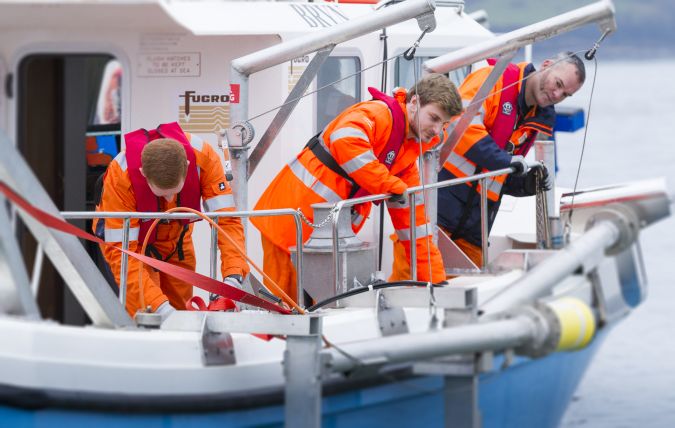
To enable this, we created our junior management development programme to support this group of staff. Unlike some earlier management courses we had run, we designed this programme recognising that the skills and behaviours needed could not be developed in a five-day short course. Instead, we adopted a ‘learning journey’ approach whereby delegates on the programme participate in a number of different learning activities spread over the course of eight or nine months. A few are classroom-based, but others are virtual, some e-learning and some simply peer-to-peer discussions. The purpose of these virtual sessions and discussions, along with associated preparation and follow-up, is to allow participants to practise what they have learned back in the workplace and then to discuss how this went, what they have learned and what they would do differently next time. By repeating this process and making it a learning journey, delegates gain experience and confidence in applying their newly acquired skills, resulting in better performance and behavioural change for the longer term.
Assessment
As with any expenditure, there is often the question of whether we have achieved a return on investment (ROI). This can apply to training, as it does to any other business activity. It is probably the one question training professionals fear most, as it can be difficult to separate the training effect from many other factors – inside and outside the organisation – that affect performance and results. Nevertheless, it has to be attempted in some shape or form. For technical skills, like software or equipment operation, you can quickly determine this by testing workplace performance or conducting a competence assessment. For some of the leadership skills we have been teaching our professionals, it’s not so easy, particularly over the short term. And over the long term, the other factors may also have greater significance.
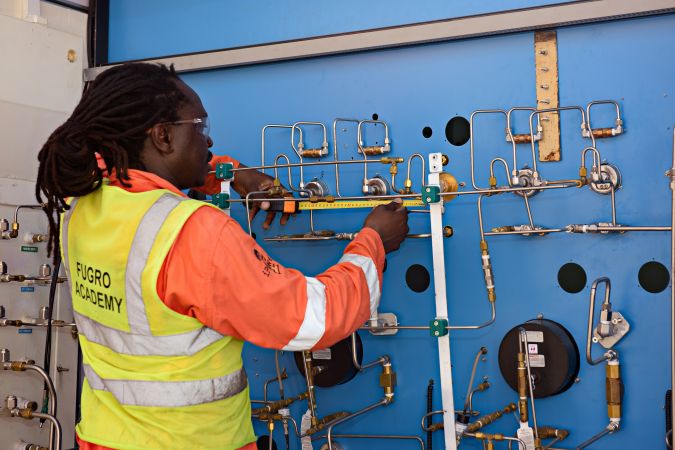
For our leadership programmes in particular, we were keen to demonstrate the value they represented to the business. Therefore, during the design phase, we planned how we would evaluate the success of the programme. This would be done six months after the formal end and would be conducted using a 360-degree survey technique whereby delegates, their managers, peers and reports all provide assessments of before and after behaviours on key measures. This assessment is repeated for each cohort going through the programme, so over time we build up a larger, more robust dataset. Early indications show good results from the programme, with survey respondents showing over 25% improvement in behaviours such as communication, delegation and decision-making. In terms of wider effects of team performance, respondents have indicated 80% improvement in engagement and collaboration. And last but not least, managers of delegates have reported an increase of 75% in capable leaders and an 84% improvement in leadership quality as a result of the programme. These results show that the programme is benefiting not just the individual participants, but also their teams and the business overall. The programme has also gained formal recognition, winning HR Network Scotland’s Learning and Development Award of the Year 2017.
Next generation of leaders
The initial and then ongoing development of staff is a key activity for any organisation. Initially this may focus on ensuring staff have the necessary technical skills to equip them for the jobs they are currently employed in. However, as many of these same people eventually take on leadership roles, it is equally important to prepare them for these roles through suitable development opportunities. Through Fugro Academy, we have been working on both aspects of this development for our technical professionals and we subsequently offer a wide range of programmes that are helping develop our next generation of leaders.
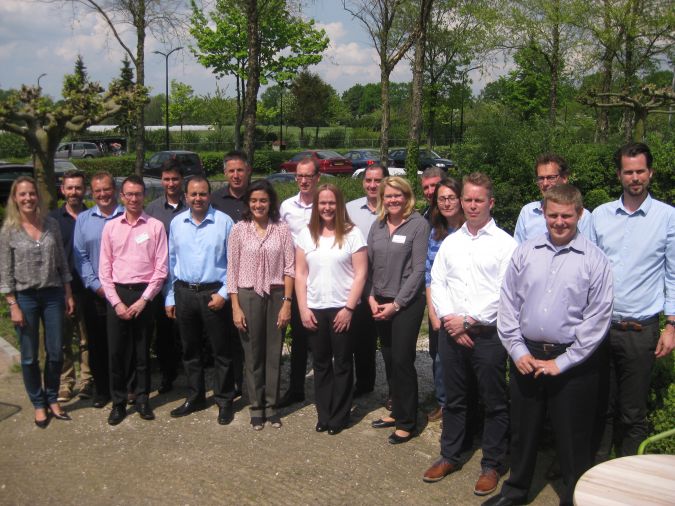

Value staying current with hydrography?
Stay on the map with our expertly curated newsletters.
We provide educational insights, industry updates, and inspiring stories from the world of hydrography to help you learn, grow, and navigate your field with confidence. Don't miss out - subscribe today and ensure you're always informed, educated, and inspired by the latest in hydrographic technology and research.
Choose your newsletter(s)
